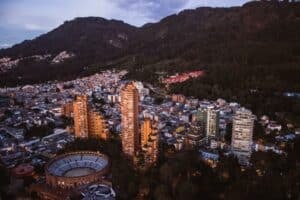Retiring in Colombia has become a popular choice for many retirees seeking adventure, culture, and an affordable cost of living.
However, making the decision to retire abroad is not one to be taken lightly, and it’s essential to have all the necessary information to make an informed decision.
This article will guide you through the process of retiring in Colombia—from the requirements to the most retiree-friendly areas, and the cost of living in the country.
If you are looking to invest as an expat or high-net-worth individual, which is what I specialize in, you can email me (advice@adamfayed.com) or WhatsApp (+44-7393-450-837).
What is the cost of living in Colombia?
The cost of living in Colombia can vary depending on the region and city you are in, as well as your personal lifestyle and spending habits.
Generally, living expenses in Colombia are lower than in many Western countries, which makes it an attractive destination for expats and digital nomads.
Here are some average prices for common expenses in Colombia (in USD):
- Rent for a one-bedroom apartment in the city center: $250-500 per month
- Groceries for one person per month: $150-250
- Local transportation (bus or metro): $0.50-1 per trip
- Restaurant meal: $5-10 for a basic meal, $15-20 for a mid-range meal
- Domestic beer at a bar or restaurant: $1-3
It’s worth noting that some areas of Colombia, such as Bogota and Medellin, tend to be more expensive than others, such as smaller towns and rural areas.
Additionally, luxury or imported goods can be much more expensive in Colombia than in other countries due to import taxes.
Can I retire in Colombia?
Yes, it is possible to retire in Colombia.
The country has become a popular retirement destination for expats from around the world due to its low cost of living, warm climate, and friendly people.
The country also offers a range of retirement visa options for foreign retirees, including a Pension Visa and a Rentista Visa.
To qualify for a Pension Visa, you must be receiving a pension or retirement income of at least 3 times the minimum monthly wage in Colombia (which is currently about $750 per month).
The Rentista Visa, on the other hand, requires that you demonstrate a monthly income of at least 10 times the minimum wage, or a lump sum of at least 350 times the minimum wage (about $90,000).
Retiring in Colombia can be a great option for those who are looking for an affordable and laid-back lifestyle, with plenty of opportunities for travel, cultural experiences, and outdoor activities.
However, it is still important to do your research and plan carefully before making the move, to ensure that you have a smooth transition and a comfortable retirement.

What are the pros of retiring in Colombia?
There are many potential benefits to retiring in Colombia.
For one, Colombia has a relatively low cost of living compared to many other countries. This makes retirement savings go further and help retirees enjoy a comfortable lifestyle without having to worry about finances.
As the country is located near the equator, Colombia has a tropical climate. This means that the weather is warm and sunny throughout much of the year. This can be particularly appealing for retirees who are looking to escape cold and dreary winters.
Colombians are also known for their warmth and hospitality. This can make it easy for retirees to make new friends and feel welcome in their new home.
The country also has a rich cultural heritage, with a diverse range of indigenous, African, and European influences. Retirees can enjoy exploring museums, art galleries, historical sites, and traditional festivals and events.
Additionally, Colombia is home to stunning landscapes, including beaches, mountains, rainforests, and deserts. Retirees can take advantage of the opportunity to explore these natural wonders, go hiking or birdwatching, or simply relax and soak up the scenery.
And most importantly, Colombia has a high standard of healthcare. The country has many modern facilities and well-trained medical professionals. The cost of healthcare is also relatively affordable compared to many other countries.
Overall, retiring in Colombia can offer a great quality of life at an affordable price, with plenty of opportunities for adventure, relaxation, and cultural enrichment.
What are the cons of retiring in Colombia?
While there are many potential benefits to retiring in Colombia, there are also some potential drawbacks to consider.
The top risk is the country’s history of political instability and violence. Although the situation has improved significantly in recent years, some areas of the country still experience high levels of crime. Retirees may need to take precautions to stay safe.
Another consideration is language barrier. Spanish is the official language of Colombia, and while many Colombians speak some English, it can still be challenging for retirees who don’t speak Spanish to communicate effectively with locals and navigate daily life.
Colombia also has a reputation for bureaucratic inefficiency and red tape. This can be frustrating for retirees who need to deal with government agencies, banks, or other institutions.
While major cities like Bogota and Medellin have modern infrastructure, some rural areas may still have limited access to basic services like healthcare and public transportation.
Colombia’s hot and humid weather may not be comfortable for everyone. Additionally, some parts of the country are prone to natural disasters like floods and landslides.
Lastly, moving to a new country can be a major adjustment, and retirees may experience culture shock as they adapt to a new way of life, different customs, and unfamiliar surroundings.
So while retiring in Colombia can be a rewarding and fulfilling experience, it’s important to weigh the potential pros and cons and carefully consider whether it’s the right choice for your individual needs and preferences.
How to retire in Colombia?
To retire in Colombia, you will need to obtain a visa. The type of visa you need will depend on your personal circumstances, but most retirees apply for either a Pension Visa or a Rentista Visa.
To apply for a visa, you will need to provide a range of documents, including proof of income, a criminal record check, and a health certificate.
Before you settle down, you will also need to find a place to live. Many retirees choose to rent an apartment or house, either in a major city like Bogota or Medellin or in a smaller town or rural area.
It’s a good idea to visit the area you are interested in before making a decision and to work with a reputable real estate agent to ensure a smooth process.
Once you have obtained your visa and found a place to live, you will also need to set up your finances. This may involve opening a bank account, transferring money from your home country, or setting up a local pension account.
You may also want to consider hiring a financial advisor to help you manage your finances in Colombia.
Retiring in a new country can be a major adjustment, so it’s important to get familiar with the local culture and customs.
This may involve learning Spanish, exploring local attractions, or making new friends in your community.
And although Colombia has a high standard of healthcare, it’s still important to take care of your health as you age.
Hence, it is advised to immediately find a local doctor, take out health insurance, or stay active and engaged in your community while staying in Colombia.

What are the requirements for retiring in Colombia?
To retire in Colombia, you will need to meet several requirements.
While there is no specific age requirement to retire in Colombia, most retirees are over the age of 50.
You will also need to obtain a visa to retire in Colombia. A Pension Visa will require you to demonstrate a minimum monthly income of around $2,000 USD.
A Rentista Visa, meanwhile, will require you to show a minimum monthly income of around $2,500 USD.
You will also need to have health insurance to retire in Colombia. This can be either local or international health insurance.
It is also important to have a place to live in Colombia.
And while there is no specific language proficiency requirement to retire in Colombia, it is helpful to have a basic understanding of Spanish to navigate daily life and communicate with locals.
Meeting these necessary requirements and taking the time to plan and prepare for your retirement in Colombia will ensure a smooth and enjoyable transition.
How much money do you need to retire in Colombia?
The amount of money you need to retire in Colombia will depend on your individual needs and lifestyle.
However, some estimates suggest that a retired couple could live comfortably in Colombia on a budget of around $1,500 to $2,000 per month.
This budget could cover expenses such as rent or mortgage payments, food, transportation, healthcare, and entertainment.
Of course, the exact amount you will need will depend on factors such as the cost of living in your chosen location, your housing preferences, and your personal spending habits.
Additionally, to retire in Colombia, you will need to meet an income requirement. This is meant to ensure that retirees have the means to support themselves while living in Colombia.
Ultimately, it’s important to carefully consider your financial needs and goals when planning for retirement in Colombia, and to work with a financial advisor or planner to ensure that you have the resources you need to live comfortably and enjoyably in this beautiful country.
Is Colombia a safe place to retire?
In general, Colombia has made significant progress in improving its safety and security in recent years. However, like any country, it is important to take certain precautions to stay safe, particularly in certain areas and neighborhoods.
In major cities such as Bogota and Medellin, there has been a significant decrease in crime in recent years.
However, certain neighborhoods and areas within these cities may still be more prone to crime, and it’s important to be aware of your surroundings and take necessary precautions such as avoiding walking alone at night, carrying minimal cash and valuables, and being cautious when using public transportation.
Additionally, it’s important to research the specific areas where you are considering retiring and to work with a reputable real estate agent to ensure that you find a safe and secure place to live.
You may also want to consider joining local expat groups or communities to connect with other retirees and get advice on staying safe in Colombia.

Where to retire in Colombia?
Colombia offers a diverse range of options for retirees, from bustling urban centers to tranquil countryside towns. Here are some popular options to consider:
Medellin
Known as the “City of Eternal Spring,” Medellin is a popular destination for retirees thanks to its comfortable climate, thriving cultural scene, and high-quality healthcare facilities.
Bogota
Colombia’s capital city offers a vibrant mix of history, culture, and entertainment, as well as easy access to world-class healthcare facilities.
Cartagena
Located on the Caribbean coast, Cartagena is a historic city with plenty of charm, culture, and outdoor activities to enjoy.
Cali
Known for its lively salsa scene, Cali is a popular destination for retirees who enjoy music, dance, and a vibrant social scene.
Santa Mart
Located on Colombia’s Caribbean coast, Santa Marta is a popular destination for retirees who enjoy outdoor activities such as hiking, fishing, and swimming.
Villavicencio
Situated in the lush green plains of Colombia’s eastern region, Villavicencio offers a peaceful and tranquil setting for retirees who enjoy nature and outdoor activities.
Ultimately, the best place to retire in Colombia will depend on your personal preferences and priorities. It’s important to visit different areas, do your research, and talk to locals and other retirees to find the place that is the best fit for you.
How can retirees integrate into the local community in Colombia?
Retiring in a foreign country can be both exciting and challenging.
Integrating into the local community can help you build a network of friends and make your transition smoother.
To do this, it is essential to learn the language as this will help you communicate with the locals and understand their culture better.
Joining local clubs, interest groups, and organizations can also be an excellent way to meet people who share your interests and passions. Many cities in Colombia have expat groups and associations that organize social events and activities.
Volunteering is another great way to meet new people and give back to the community. You can volunteer at local schools, hospitals, animal shelters, or environmental organizations.
With its rich cultural heritage, Colombia also offers plenty of festivals, music concerts, and other events throughout the year. Attending these events can be a great way to immerse yourself in the local culture and meet new people.
Enrolling in local classes such as cooking, dance, or art can be an excellent way to learn new skills, meet new people, and immerse yourself in the local culture.
Lastly, hiring a local guide can be an excellent way to explore the local culture, learn about the history and traditions, and meet new people.

Conclusion
From the bustling urban centers of Bogota and Medellin to the tranquil countryside towns of Villavicencio and Santa Marta, Colombia offers a diverse range of options for retirees looking to make the most of their golden years.
While there are certainly challenges to retiring in a foreign country, many retirees have found that the benefits of retiring in Colombia far outweigh the challenges.
By taking the time to research different areas, learn the language, and connect with the local community, retirees can integrate into the rich cultural fabric of Colombia and build meaningful connections with their neighbors and fellow expats.
Ultimately, the decision to retire in Colombia will depend on your personal preferences and priorities. However, for those seeking a warm and welcoming community, a rich cultural heritage, and a relaxed pace of life, Colombia is certainly worth considering as a retirement destination.
Pained by financial indecision? Want to invest with Adam?

Adam is an internationally recognised author on financial matters with over 830million answer views on Quora, a widely sold book on Amazon, and a contributor on Forbes.



